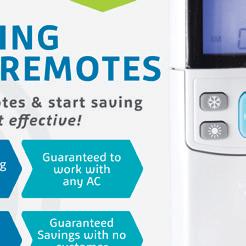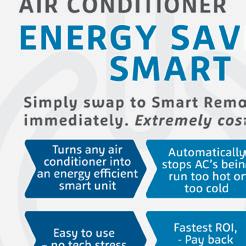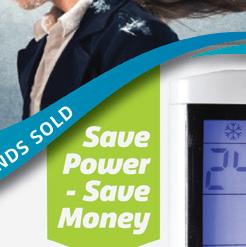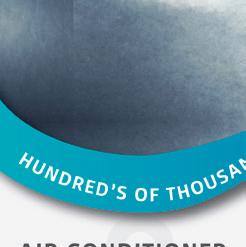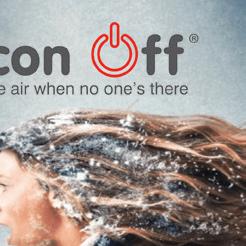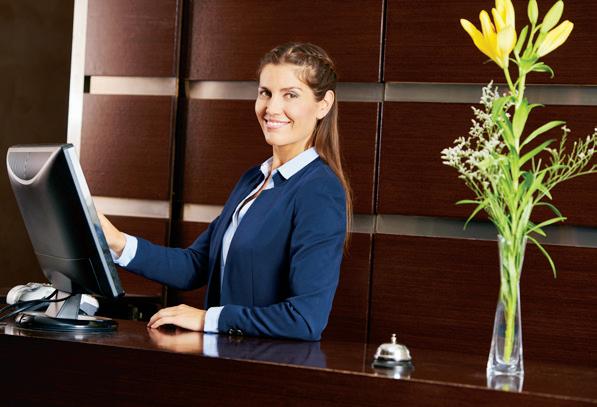
7 minute read
Reinvent the welcome experience with self-check-in
It is time to reinvent the self-check-in process, and that does not mean only cutting back frontdesk employees.
For decades, hotel brands have been attempting to launch various versions of self-check-in.
In the 1990s, I remember much talk but little adoption beyond beta tests. In the early 2000s, brands like Embassy Suites and other Hilton brands rolled out kiosk-style check-in machines with great fanfare but little utilisation, other than a few guests who used the machine to print airline boarding passes. In the 2010s, more brands jumped in,
Doug Kennedy President, Kennedy Training Network
including Marriott International, Hyatt Hotels Corporation, and large Las Vegas properties
hospitality training, I recall many times observing long queues for traditional guest registration while the machines stood idle.
More recently, brands like Hilton finally got a bit of traction when they launched self-check-in via smartphone, and soon thereafter digital room keys. PMS companies introduced self-check-in via iPad or tablet stations, where guests activate their own traditional key. Still, the overall such as the MGM Grand.
adoption by hotels, along with utilisation by guests, remained low relative to traditional registration procedures.
Then came the COVID-19 pandemic which, as it has done in so many other aspects of our business and personal lives, accelerated the pace of changes already underway. As it has quickly advanced the pace of migration from retail to online shopping, the move to distance learning and the transition to work-from-home models, so has it advanced the adoption of self-check-in.
Now, as we move forward as an industry, I hope visionary leaders will recognise what a major crossroads this seemingly inconsequential change brings our industry to. My fear is that too many lodging leaders will see this only as an opportunity to reduce payroll and cut costs. In doing so, they will be eliminating the last major ‘touchpoint’ in the guest
service cycle as more guests book online, arrive by rideshare (eliminating greeting by a door or valet parking attendant), and use wheeled luggage, eliminating the conversation with a bell-person.
I fear leaders will buy into the millennial myth that younger people prefer tech over touch, hate conversing with strangers, and want to run their whole lives via smartphone apps. Meanwhile, these same leaders still believe that brand loyalty programs will be the key to guest retention in the era where there is no longer a physical key.
Yet I still have hope that the wisest lodging leaders will recognise that the adoption of self-check-in, whether by smartphone, kiosk, or tablet version, presents a monumental opportunity to reinvent and rehumanise the guest welcome experience.
Obviously, everyone knows we will always need a human near the lobby to assist when self-check-in systems do not work, such as when cards decline, smartphones die or when guests have a disability.
But leaders who see their companies as being in the hospitality business and not the room rental business will recognise this moment as a chance to move away from scripted, transactional welcomes and back towards what the front desk used to be all about: authentically greeting guests with warmth and generosity. A look back in hotel history points the way forward. When I started at the front desk working for Marriott in 1984, it was at the tail-end of the era of the front-desk ‘rack’, as Marriott like other brands were just becoming computerised. During registration, we spent the majority of time holding eye contact, determining the purpose of each guest’s visit, welcoming them ‘home’ and providing local insider’s tips. We had to look away only briefly to grab a color-coded room card showing ‘ready’ off that rack and a room key from the cubby, then again only briefly
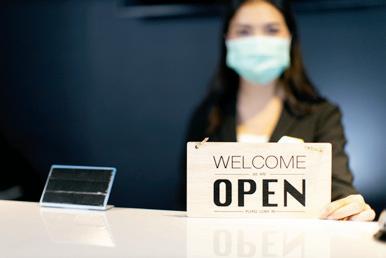

as we imprinted their credit card or put their cash into our drawer. Then from the mid-1980s, all the way until today, guests spend more time staring at the top of peoples’ heads while front-desk staffers stare at a computer which seems to run ever slower.
Now, if properly deployed, self-check-in allows front-desk colleagues to once again be free to hold conversations and focus on the people in front of them, not the process.
It is time to reimagine the staging area of the front-desk theatre and get staff from behind the barriers
©anon - stock.adobe.com and into the lobby with movable podiums or adjustable stand/sit desks. Deployed at the entrance, front-desk colleagues will have countless opportunities to chat with guests as they wait for their rideshare or for their companions to park vehicles. Likewise, they can engage guests as they depart and solicit feedback with sincerity, encouraging those who had positive experiences to share them on social media.
So yes, I have hope for the future of our industry and that visionary leaders will recognise this as an opportunity to return to our core mission of hospitality. Realistically though, I expect that too many leaders will take what is likely to be the more crowded road out of this pandemic, leading to commoditisation and a complete takeover of distribution by the online travel agencies. Too many hoteliers will falsely believe that a guest can be welcomed with a text message stating their name or by a so-called ‘personalised’ app message, all of which makes me feel about as ‘warm and fuzzy’ as a birthday email from my dentist.
In the end, one hotel brand will never be able to ‘out-tech’ another. It has always been and always will be the people parts that make the difference.
Doug's articles are originally published in by HotelNewsNow and Accom News shares them with permission.
Preferred Supplier Programme
assisting the industry
For over twenty one years in Australia the preferred supplier programme and directory has been an extremely valuable and eff ective tool for accommodation managers.
It allows managers to access industry specialists who are committ ed to the highest levels of service and dedicated to the accommodation and hospitality industries. This is extremely helpful for all accommodation providers but especially new managers as it allows them to benefi t from the positive experiences other managers have had with their suppliers.
Listed below are the stages of the process that ensure only the best industry suppliers can participate in the Preferred Supplier Programme:
All suppliers must receive a nomination from a property currently using their services that is completely satisfi ed with their levels of service and are prepared to recommend them to another complex in the industry (ie. if asked by another manager they could comfortably recommend the required supplier).
All nominations received are then qualifi ed through a secondary questionnaire process to ensure nominated suppliers are able to provide the highest levels of service required and expected by managers.
Suppliers that still qualify are then asked to commit to the required levels of service for the next 12 months guaranteeing their commitment to the industry.
Subject to the satisfaction of these processes and commitments suppliers then go on to the Preferred Supplier Database. Only Preferred Suppliers in this database have the opportunity to utilise the Preferred Supplier logo and make their contact details available to managers via the Preferred Supplier Directory, located in every issue of the A and online at accomnews.com.au.
5. Preferred suppliers have their status reviewed every 12 months to ensure they still qualify and that their commitment to the industry is being met.
With these criteria in place it means that you as a manager have access to a complete range of specialist suppliers who are actively seeking to improve their services to the accommodation industry.
For your own peace of mind when dealing with any supplier ask if they are a Preferred Supplier. This can be verifi ed by viewing a Preferred Supplier logo – made available for use in any of their stationery or marketing material or more simply by locating them in the Preferred Supplier Directory. So when looking for products or services give yourself the peace of mind that you are dealing with a recognised industry specialist and support these suppliers who are committ ed to servicing your needs.
Control your aircon Costs!
the
remote
The Ultima II remote gives you more control over your air conditioners. Programmed for you to save you money!
thermocontrols.com.au
BEDS & BEDDING

manufacturers of quality bedding QUALITY WITHOUT COMPROMISE FACTORY PRICES DIRECT Sunshine Coast (07) 5446 7541 Cairns (07) 4032 5133 www.themattresscompany.com.au
Save time... Do it Online... The sign of an Industry Specialist
www.accomnews.com.au/ business-directory
ELECTRICAL APPLIANCES
Your Hotel TV and Digital Signage Specialist
Quality Certified AU1135-QC ISO 9001:2015 T 1300 659 053 M 0412 974 878 E paul@yardley.com.au W yardley.com.au
FURNITURE

